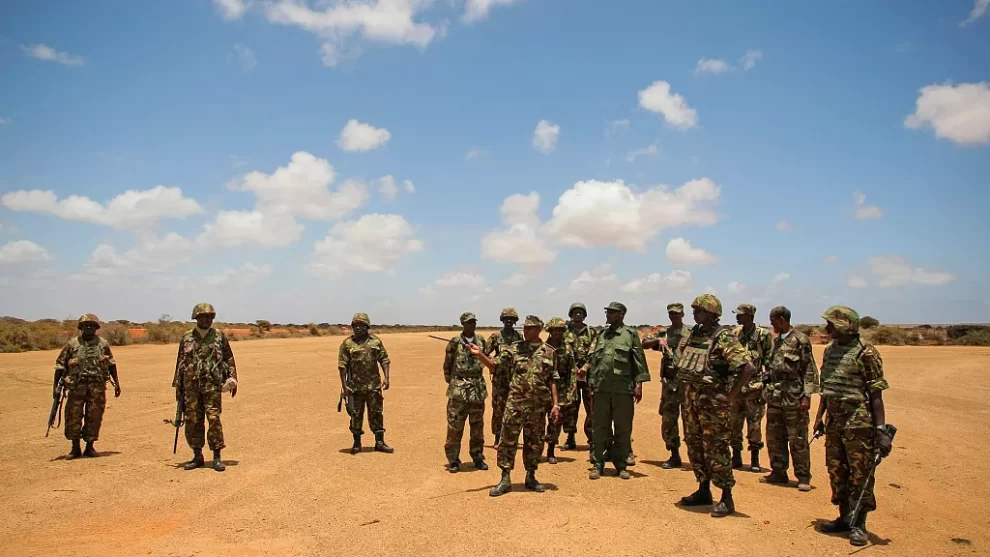Kenya’s Defence Ministry said on Wednesday September 4 that it will withdraw its last troops in Somalia under the African Union Transitional Mission in Somalia (ATMIS) by the end of 2024.
The planned withdrawal was confirmed by Defence Cabinet Secretary Aden Duale to the Senate.

“The last troops are expected to leave Somalia on 31 December 2024 as per the AU and UN Security Council resolution and plan,” Duale said.
Duale’s confirmation comes despite a recent delay to the scheduled drawdown, following a request by Somalia to pause the drawdown of African Union peacekeepers for three months.
There are more than 4,000 Kenyan troops deployed in Somalia under ATMIS, alongside troops from Uganda, Ethiopia, Burundi and Djibouti.
What is ATMIS?
The AU’s Transitional Mission took over from the AU’s Mission in Somalia (AMISOM) in April 2022.
A United Nations-mandated mission, AMISOM began in 2007 as a peacekeeping force in the country, as Somalia – and the broader region – battled against the al-Qaeda affiliated group al-Shabaab.
The mission was also eventually mandated to help protect Somalia’s transitional government, support the country’s electoral process and assist in delivering humanitarian aid.
By mid-2017 the world’s largest peacekeeping operation, the mission helped to push back against al-Shabaab, paving the way for an eventual drawdown.
In April 2022, the AU renamed the mission ATMIS and, while its mandate has been largely the same as its predecessor’s, the mission’s ultimate goal is to conclude operations in Somalia by the end of 2024 and hand over the reins to the Somali government.
However, while al-Shabaab has been forced into retreat in parts of the country and international bodies have lauded the Somali government’s efforts against them, attacks by the Islamist insurgency are still all too frequent and continue to spill over the border into Kenya.
Security situation in Kenya
In July 2023, Kenyan Interior Minister Kithure Kindiki announced that the scheduled reopening of the Kenyan border with Somalia would be postponed.
The Somali-Kenyan border had been closed since October 2011 but following Somalia’s presidential elections in May 2022, the two countries announced their intention to reopen the crossing.
A spate of attacks by al-Shabaab on Kenyan territory near the border, however, stalled these plans.
On June 13, eight Kenyan police officers were killed in Garissa by an Improvised Explosive Device (IED). Then, on June 24, five civilians were killed in Lamu in a gruesome attack claimed by the insurgents.
Rising threat from al-Shabaab
Between June and early August there were over 90 attacks involving al-Shabaab militants in the border area, according to the non-profit Armed Conflict Location & Event Data Project (ACLED).
The crisis-monitoring group has warned that the ATMIS drawdown of troops, alongside the Somali counter-insurgency, is leading to a resurgence of al-Shabaab in the area.
Several military bases handed over by ATMIS to the Somali forces have reportedly been attacked by al-Shabaab, and, as the Somali forces push back against the insurgents, they are fleeing towards the Kenyan border.
Attacks in Kenya are nothing new. Since the Kenya Defence Forces were first deployed to Somalia in 2011, al-Shabaab have all too frequently violently retaliated. The deadliest of the attacks happened in the country’s north-east in 2015 when 148 students were killed at Garissa University.
The renewed violence suggest that al-Shabaab are still a force to be reckoned with.
Acknowledging the increased threat, Kenya has built 14 operating bases along the Kenya-Somalia border and has promised to better equip its military and police forces.
For now, much remains uncertain about the state of Somali and regional security ahead of the scheduled departure of ATMIS at the end of next year.
While Duale’s statement to the senate on Wednesday was a firm commitment to the AU’s plan, Ruto has previously said that “if necessary […] we are going to stay beyond the drawdown timetable so that we don’t lose what we have achieved [and allow] al-Shabaab back into the equation”.
Source:AFRICA NEWS




















Add Comment